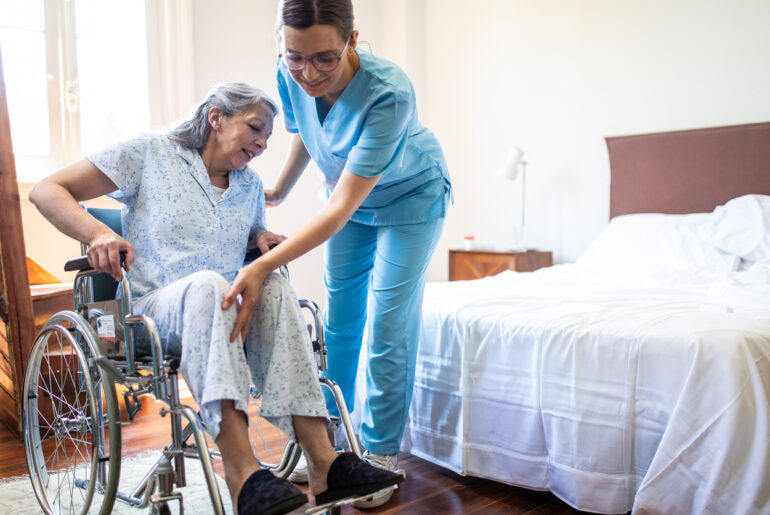If you’re looking for a career in the healthcare field that doesn’t require a 4-year degree, becoming a Certified Nursing Assistant (CNA) or Home Health Aide (HHA) may be a good option. Most CNA certification programs take between four and 12 weeks to complete, while aspiring HHAs need to complete at least 75 hours of training.
Job Duties
A CNA or HHA spends the majority of their time assisting those in their activities of daily living, which are vital to the physical and mental health of residents in their care. Those activities include feeding, bathing, dressing, grooming, transportation within the facility, and one-on-one activities with the patients, among other duties.
Throughout the day, CNAs observe and gather vital signs from their patients, such as blood pressure, temperature, pulse, respiration, oxygen saturation, pain level, and more. CNAs are also responsible for assisting nurses with preparing, gathering, and sanitizing medical equipment, or assisting with blood draws, changing catheters, dressing wounds, and other tasks.
Training Requirements
Both CNA and HHA candidates need to attend and pass an approved training program that meets both the federal and state guidelines for their focus before they are eligible to take their licensing exam. National guidelines require CNA and HHA applicants to complete at least 75 hours of training and 16 hours of clinical experience in the field, although many states require 76-180 hours of training and up to 100 hours of clinical experience. Check with your state to identify CNA/HHA requirements.
Other requirements include:
- Must be 18 years or olders (some states allow 16 or 17-year-old applicants with parental consent)
- High school diploma or equivalent
- Valid driver’s license/state ID
- CPR and first aid certification
- Physical exam
- Immunizations (vary by state regulations)
- Tuberculosis test results
- Background check and fingerprinting
Written exam
The CNA and HHA exams vary by state and include 60-70 questions that must be completed in 90 minutes. Both exams cover 13 core topics related to patient care, ethics, legal issues, and roles and responsibilities, although the CNA exam asks more technical questions.
The CNA and HHA exams scoring is based on a traditional percentage score. Candidates must score a 70 percent or 80 percent to pass the written exam, depending on which U.S. state in which you’re trying to gain certification.
Practical Skills Exam
Test takers must also score a 70 percent or 80 percent on the practical skills exam which consists of three to six randomly-selected skills based on real-life scenarios. These skills include handwashing, taking blood pressure, feeding a patient with right-side weakness, changing bed linen while the patient remains in the bed, and bathing a bedridden female, among others. The skills test is completed in 25-30 minutes. Test takers must pass all critical skills components of the practical skills exam, or they will automatically fail.
You can only take the test 3 times in two years following your training program. After the third time, you must repeat the training program before you can test again.
Job Outlook
According to the U.S. Bureau of Labor Statistics, employment for CNAs is expected to grow eight percent from 2019 to 2029, while HHAs are projected to see a 34 percent increase in job growth. The positive job outlook is due to an ongoing need to help care for an increasing older population.
RELATED: Doctor Isn’t Your Only Option: Healthcare Careers that Require Only 2 – 4 Years of School
Preparing for the Exam
Peterson’s comprehensive CNA/HHA exam prep includes six full-length practice tests, multiple lessons covering all 13 core topics of the exams, job duties, testing requirements, tips for test day, mini-quizzes, and more. Start studying today, and take the exam with confidence!



